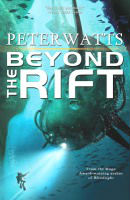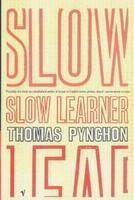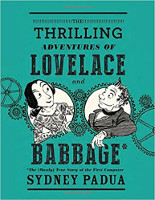 Peter Watts is a Canadian hard SF author and “reformed marine biologist” (his own words), with 5 published Novels (one of them published in two volumes for ‘commercial considerations’) and 2 collections of short stories to his name; Beyond the Rift, the topic of this review, being the latest of those. He was recently labelled a “sociological futurist Lovecraft” in a discussion on Charlie Stross’ blog – very fitting I find, in relation to at least some of this book!
Peter Watts is a Canadian hard SF author and “reformed marine biologist” (his own words), with 5 published Novels (one of them published in two volumes for ‘commercial considerations’) and 2 collections of short stories to his name; Beyond the Rift, the topic of this review, being the latest of those. He was recently labelled a “sociological futurist Lovecraft” in a discussion on Charlie Stross’ blog – very fitting I find, in relation to at least some of this book!
He has a brand-new novel, titled Echopraxia, scheduled for 2014 - now there's something to look forward to!
All stories in the collection have been previously published between 1994 and 2010 in a variety of locations and formats, and one of them (The Island) has won the Hugo Award for best Novelette He is himself not completely convinced by some of his old work when re-reading the stories:
“I’m revisiting some of them for the first time in almost a quarter century. Some stand up. Others, not so much. […] Anyone interested in tracking my development as a writer through the years might find it valuable as a kind of Wattsian proto-story, containing the crudeiments of themes later explored with greater sophistication”
Personally speaking I didn't think things were all that dire, I thoroughly enjoyed nearly everything in the collection (and yes, some of them were re-reads. And worth re-reading).
There is one original and never before published piece in the book – an essay by the author titled “Outro: En Route to Dystopia with the Angry Optimist”, where he expounds and reflects on his themes, the reception thereof (what people read frequently does not match what the writer feels he has written, of course!), and “the lack of villains in my fiction, and the abundance of villains in reality” – no prize for guessing that his arrest and beating at the hand of American border guards on trumped up charges features…
Definitely a recommended read, maybe even as an introduction to the author, although I’d strongly recommend his Rifters series (Starfish, Maelstrom, Behemoth) and the claustrophobic (and Hugo nominated) Blindsight, too.
Below is a list of stories in the books, and a few words each on topic and/or my impressions. If you think this might spoil your enjoyment of the book then stop now…
The Things
A reversal of (and, I would think, homage to) John Carpenter’s The Thing; experiencing the story from the reverse viewpoint, ie from the Thing (or, rather, the Things). It not only neatly reverses the viewpoint, but also the horror (at the state of the human condition in this case) but also provides a rather neat commentary on the missionary reflex – such a lovely trait, and apparently not limited to humans.
The Island
Hugo-award winning story of a long-term, one-way construction ship building wormhole gates ahead of (post-)humanity's (or whatever has taken its place by now) expansion into the unknown, and the conflict between their (simple, on purpose) AI and the human crew who spend nearly all time in suspension between ‘builds’. And the next build is near a star which harbors intelligent life – as a diaphanous veil around the star, ie some kind of biological Dyson Sphere which would/will be killed when the gate is activated. We’re being led astray in a Frederic Brown manner, but with an ambiance feeling more reminiscent of Charles Stross’ Scratch Monkey, for some reason. Sterling stuff.
The Second Coming of Jasmine Fitzgerald
The story of a scientific discovery into the reality underpinning the universe, of a student who begins to understand the implications of that paper, and who tries to ‘fix’ her husband who suffers from cancer (and kills him in the process). God delusion or godly powers? Her court psychologist tries to find out…
This had loads of promise to walk the line between mysticism/theism and science just a tad on the ‘wrong’ side, and, in the process, really set our heads spinning. Sadly is fails to deliver fully on its promise – a lost opportunity in this form, I felt.
A Word for Heathens
A story of a Champion of the Faith, and his glorious (read: horrific and cruel, but justified) deeds in the struggle against the heathens. This plays in a world where the presence of god can be felt via the application of electromagnetic fields to the brain – and people believe, even if/as they know this. And it poses the question of what happens to humans who cannot, or not anymore feel this artificial presence of god – queue thoughts of Zimbardo, and ever more so of Milgram. Not pretty.
Home
A rifters story, where one of the workers adapted for deep-see work who had gone ‘native’ (i.e. removed themselves from the underwater station to live their live out in the ocean) comes back to a station. A fragment only, albeit a compelling one.
The Eyes of God
A story playing out whilst the protagonist waits in the screening queue at an airport; waiting to board a plane to the burial of the priest who abused him as a child. In this world there exists technology which allows to screen people not only for what they have with them, but also for what they have done, what they have thought, and what they might do.
If we could do this we would, and, I have to say, this scares me more than I can say.
Flesh Made Word
The story of a researcher, psychologically damaged by the death of his wife, researching now the organism’s action/reaction to death. And losing his humanity in the process, through a growing belief that all a human consists of is a biochemical machine. This is the second story with such a drift (the other one is ‘The second coming…’) reducing humans in a mechanistic/deterministic scenario, which betrays, if not a tendency, then at least a preoccupation in part of the author.
Nimbus
Clouds consist of distributed intelligences, which form, move, act, and re-distribute. And they have had enough of humanity, so we’re facing the worst weather, consciously attacking us with storms and hurricanes, at all times. To some extent this is an eco-fairytale, and to some an analogue to the human body and its parasitic/symbiotic passengers, as the next generation of humans is adapting and maybe developing some kind of resistance/immunity. Entertaining, if, in comparison to most of the rest here, rather fluffy…
Mayfly (with Derryl Murphy)
A child born with severe brain damage has been given a cybernetically simulated brain, and thus lives permanently wired into a computer system in a top secret, underground facility. Her parents are rather helpless in this arrangement, all the more so as the scientists who created this chimera cannot stop playing god… with the result that she finds ‘reality’ rather underwhelming, and with lacking controls for the simulation parameters…
Not a new idea, but very well executed, this one really pulls you along a breakneck speed. Dark, and beautiful.
Ambassador
Nothing which has evolved long enough to reach space/colonise their solar system/create interstellar flight must, by definition, have left its violent past behind and be pacifistic. Heard this before? Peter Watts say No – this stream of consciousness story provides us a very different, much more Darwinian variant on what ongoing competitive evolution amounts to.
Hillcrest v. Velikovsky
Can you kill someone who is being kept alive by the placebo effect if you explain to them how said effect works? This is what this court case is trying to establish – with an unexpected and rather entertaining solution. Quick, smart, fun.
Repeating the Past
Most of us only remember a little of the recent past, so are we bound to repeat anything we don’t remember and thus understand in the guts ourselves? This is the story of a Jewish boy who joins a group of far-right Skinheads, of the horror this causes his mother and grandmother (who remembers in person); and of the solution they come up with. Ouch.
A Niche
Another rifters story – essentially what became the first chapter of Starfish. And no, I have not compared them word for word. Why should I? It works as a stand-alone story, at works as the opening shot for this rather grand book and trilogy, and it might well be slightly different for the two separate purposes. Essential, in my opinion.
Still with me? Interested? Time to go shopping!
Recommended soundtrack: Nine Inch Nails - Y34RZ3R0R3M1X3D
Title: Beyond the Rift
Author: Peter Watts
Reviewer: Markus
Reviewer URL: http://thierstein.net
Publisher: Tachyon
Publisher URL: http://www.tachyonpublications.com
Publication Date: Nov 2013
Review Date: 131205
ISBN: 9781616961251
Price: UKP 12.50 RRP
Pages: 217
Format: ePub
Topic: SF
Topic: Short Stories
Thanks to the publisher for the review copy.













